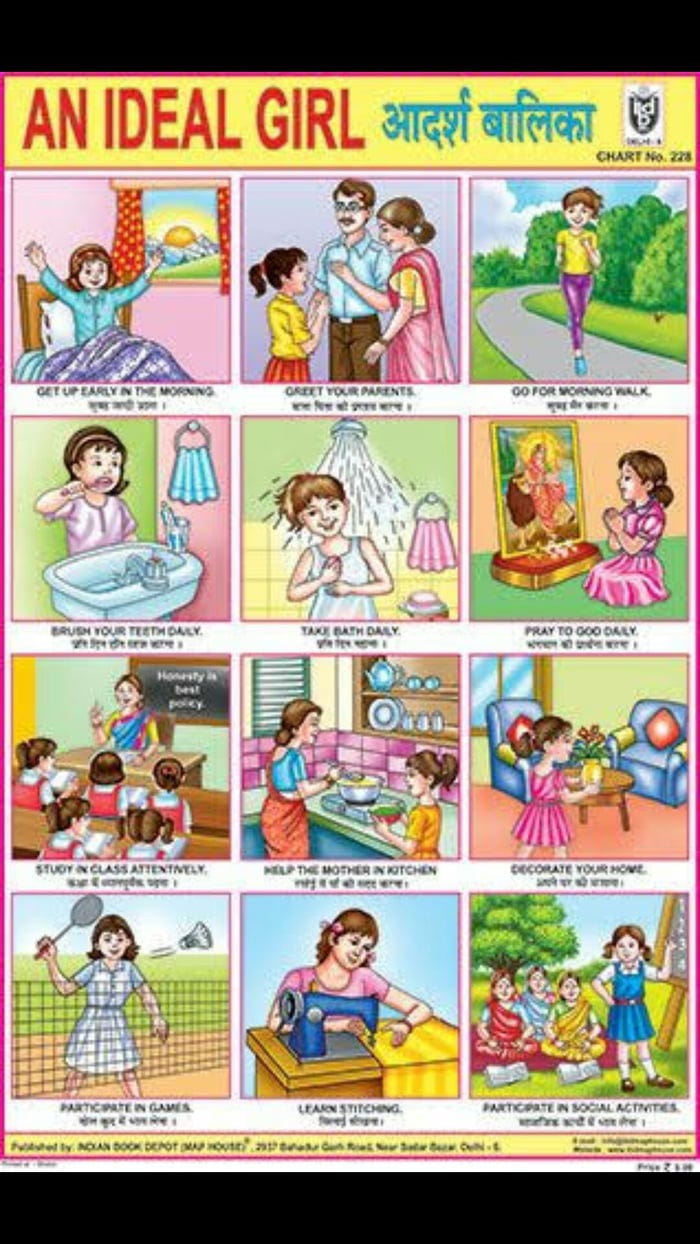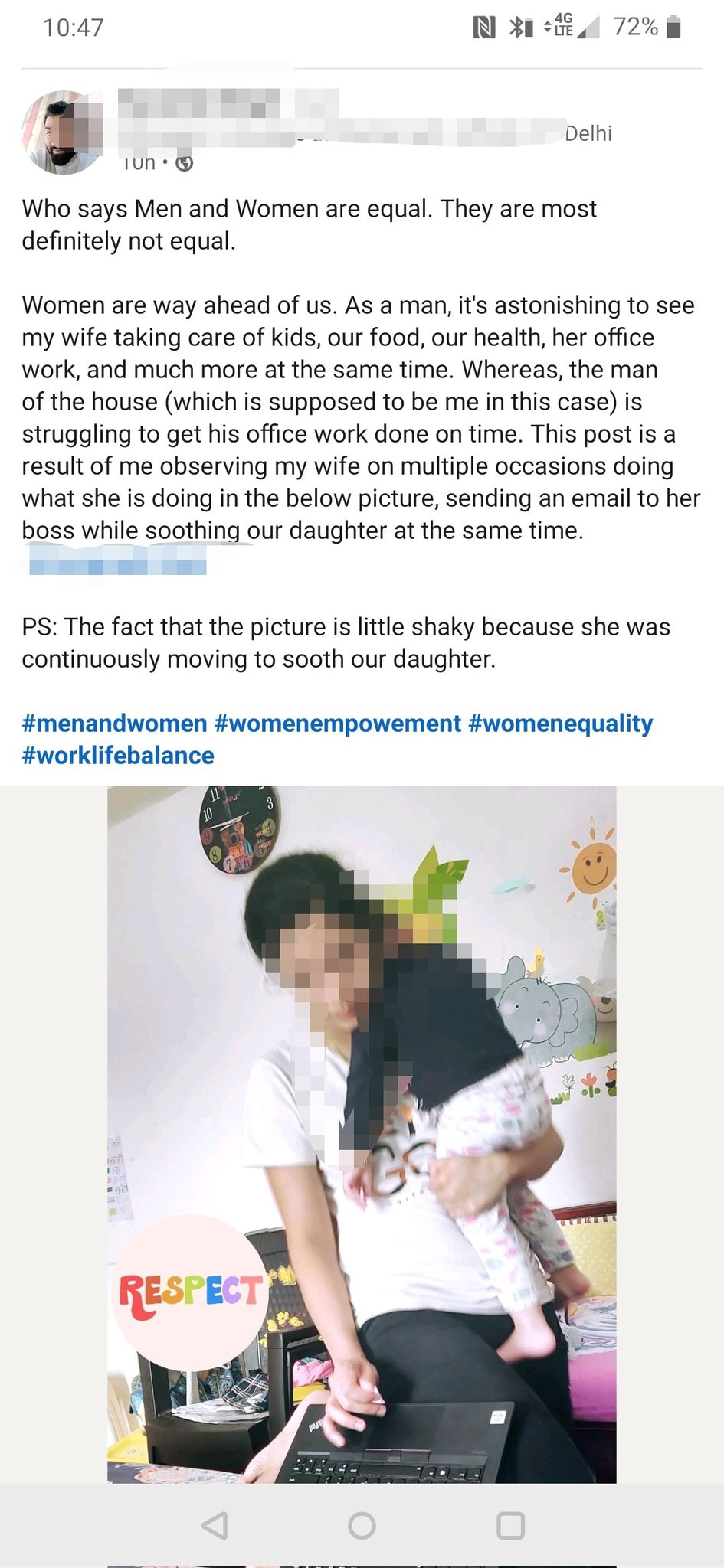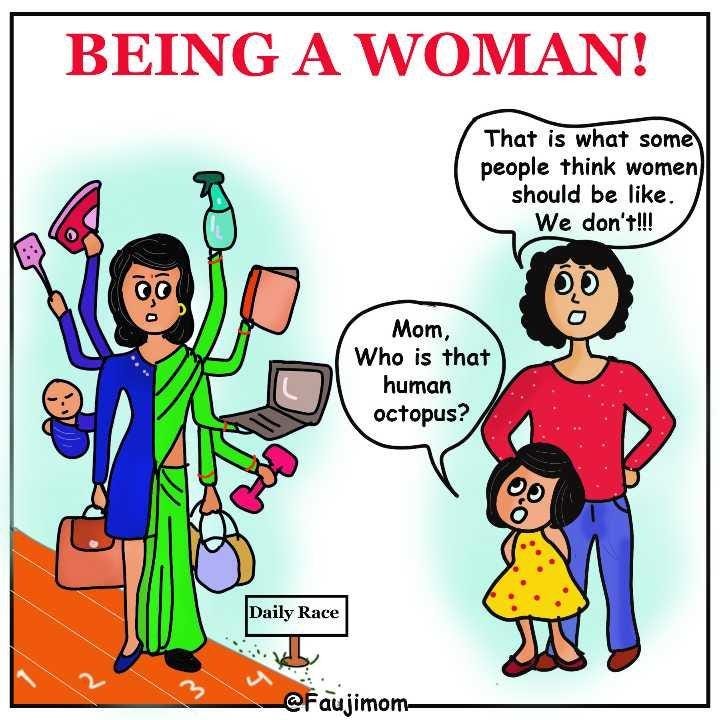Hello ji,
Fellow CBSE students, remember those painful essays we wrote at school?
The ones where we got extra marks for beginning and ending with a famous-person quote?
At my school, we used to mug up Hindi quotes for all the blockbuster topics - ‘विज्ञान: वरदान या अभिशाप?’ (Science: Boon or bane?), ‘आतंकवाद की समस्या’ (The Terrorism Challenge), and of course, the evergreen ‘नारी का सम्मान’ (Respecting women).
I was trying to recollect some of the quotes I used to memorize for that last topic. Here are three that I could recollect:
यत्र नार्यस्तु पूज्यन्ते रमन्ते तत्र देवताः
Which is Sanksrit for "The Gods reside in that land where women are worshipped"
"क्या कहती हो ठहरो नारी! संकल्प अश्रु-जल-से-अपने।
तुम दान कर चुकी पहले ही जीवन के सोने-से सपने।
नारी! तुम केवल श्रद्धा हो विश्वास-रजत-नग पगतल में।
पीयूष-स्रोत-सी बहा करो जीवन के सुंदर समतल में।"
From the epic-poem ‘Lajja’ by Jayashankar Prasad, where he lauds every woman for the many sacrifices she makes for the sake of her man - including the sacrifice of her tears, her hopes, and her dreams.
अबला जीवन हाय! तुम्हारी यही कहानी, आँचल में है दूध और आँखों में पानी!
From another epic-poem ‘Yashodhara’ by Maithilisharam Gupt where he describes the plight of Yashodhara - the wife of Prince Siddharth, who renounced family life and became Gautam Buddha, leaving her alone to fend for their one year old son. The poem literally talks about how Yashodhara was left with tears in her eyes and milk in her breasts, but was used at my school as another generic women-praising quote for our essay-writing purposes.
Q. What is common across all of the above ‘women empowerment’ quotes that I grew up mindlessly committing to memory?
A. They all taught us kids that women should be respected because they sacrifice so much - for their husbands, their kids, and their families.
Cut to 2021. A show of hands.
Who remembers that pic of the lady hooked on to an oxygen concentrator, which was doing the rounds during the second wave of Covid earlier this year? Of course, a number of covid patients - especially senior citizens - needed oxygen support to breathe as the virus waged a war on their respiratory system.
But this pic was special, because in it the woman was cooking chapatis for her son while breathing through the machine.
If you missed this photo, you might be surprised to learn that it was not taken and circulated by Amnesty International as evidence of abuse of women in their own homes.
No, this pic was taken and shared by the woman's own son.
Here it is, for your viewing (and vomiting) pleasure.
Social media duly responded to this image by panning the son for making his mother cook in such a serious condition. Many even pointed out how taking a concentrated source of oxygen so close to a stove could result in an explosion. For most women, of course, that might be the only way to get ‘off-duty’ from the slavery they are subjected to in the name of ‘unconditional love’.
I would honestly not have been too surprised if a couplet or quote praising women for their sacrifices accompanies the picture as well. Because both - the couplets and this image - peddle the same misconception, that women are amazing because they sacrifice so much. That they deserve respect and adulation for silently bearing the burden of their loved ones’ collective laziness.
I spoke to some women about these ‘compliments’ that they have noticed being given to women, which reinforce this image of a sacrificial woman as the ‘Aadarsh Bharatiya Naari’ (ideal Indian woman).

Happy Women's Day!
Some feelings expressed by a friend about Women’s Day forwards
It recurs, particularly around Women’s Day. Year after year, I get sent this image on office Whatsapp groups - of the multi-handed Devi juggling work, home, babies, etc. This Superwoman has at least ten hands - one has a ladle, another has a laptop, a baby is wailing in a third, grocery bags teeming with veggies and fruits are in a fourth, and so on.
I have never been more triggered than when I see that image. The innate assumption is that the fact that women do many many things at the same time is something to be celebrated.
But the reality is that such ‘celebrations’ put us on a thin tightrope. As a woman, attempting to walk this tightrope is a lose-lose proposition for me. I am either supposed to do it all, be it all, and lose all sense of myself in the process. Or, I am supposed to fail trying - plunging from the tightrope to my death into the crocodile-infested water, where my family, friends, colleagues, acquaintances, neighbours, and neighbours’ cousins are all waiting to tear me apart because I failed to embody the Devi that every woman is supposed to be.
Supermom!
Shweta’s take on being called “Supermom” at her workplace
I am a working mother with two young children, and I am most irritated by the concept of ‘Supermom’. It is tiring and exhausting, and there is nothing to be celebrated about it.
If I am juggling kids and work and everything else in between, it is not because I am some God-gifted ‘Supermom’. It takes a huge amount of work. I have to prioritize tasks in real-time, I have to be relentless, and I have to multitask all the time. It would be nice if people saw all this underlying hard work that all working moms have to put in, rather than just tom-tomming some imaginary version of us who has got it all under control magically.
I get especially irked when my colleagues call me Supermom at work, because it reduces all my work experience, my skill set, and everything I bring to the table professionally to the uni-dimensional identity of being a mother.
Also, while I am at it, how come I have never heard the term ‘Superdad’ thrown around for my male colleagues who are also fathers? How come their kids are almost never even mentioned in professional conversations, while my entire professional identity has been engulfed by the fact that I am a (super)mom?
Her Husband's Supermom
Komal’s husband thinks she is a “great mother” and she has to pay dearly for it
My husband praises me for being a great mother to our son. Ever since he was a baby, I would be the one thinking about his learning, picking a range of activities for him to learn basic skills. When he grew up a bit, my husband even left the choice of his school to me.
Under the guise that I am a better judge and more knowledgeable in these matters, he has left all the major decisions around our son's upbringing to me. It is too much responsibility and the mental load is exhausting. When I face a dilemma, I cannot even rely on him for an informed second opinion. I am bogged down by these critical decisions that I have to make single-handedly, while he gets to go on with his life without spending any mindshare on it, having ‘delegated’ it all to me.
The price of being a "great mother", I suppose!
Women who "do it all"
Ankita is staunchly not following in the footsteps of her family elders
In my family, I have heard endless stories of how my mother / grandmother / mother-in-law ‘did it all’! They had a job, they ran their house, they raised their kids, all while managing an endless flow of visitors, rituals, and festivals. (Cue applause!)
Whenever such stories are narrated with pride, I always wonder, "How come nobody questions WHY they did it all? Or rather, why did they have to do it all?"
Nobody asks that question because nobody wants the unfairness behind these relationship dynamics to be exposed.
Today, I am a working mother. And I am careful about very unapologetically not doing it all. I never really receive any ‘compliments’ from the family for this, but I am happy with my choice.
In fact, people sometimes come up to me now and tell me that they are in awe of the fact that I have a job, a baby, a fitness routine, a house. And everytime, I tell them not to put me on a pedestal. I have what I have because I choose to put myself first, instead of falling into society's expectation of being a self-sacrificial lamb of a woman.
A ‘real’ woman
Chitra thinks ‘sacrifice’ needs to be banned from the list of things that maketh a woman
Since childhood, I have seen my mother 'sacrifice' or 'compromise' in various ways. Not pursuing a career outside the home, not traveling on her own, not even having friends of her own outside the circle of 'family friends'. Most of these decisions were not even considered sacrifices or compromises, but just a logical course of action. In the conversations that I heard growing up - from my parents and others of their generation - the societal judgment of women who behaved in these acceptable ways, and those who didn't, was very clear.
I look like my mother. But I know that not just in appearance but also in personality, I have to play a certain role around the extended family which is 'acceptable' to others. Even if I belong to a generation where women have relatively more freedom and opportunities, I can't take it too far, otherwise, I might be seen as a troublemaker, or - for someone like me - not even a real woman.
I can be selfless for my child, but I could have taken any of those selfless actions as a parent irrespective of gender - why does motherhood specifically need to be put on a pedestal for that?
Here's some LinkedIn gratitude for your slavery, m'lady.
If the Taliban put out a photograph of the many atrocities it is committing on women, with a message "We don't say this every day but your sacrifice of all your freedom and liberty has not gone unnoticed", what would your reaction be?
If it happened on LinkedIn, apparently the post would go viral with hundreds of thousands of likes and kudos from men and women appreciating the Taliban for being such an awesome dictatorship.
There is a beautiful new term called ‘Virtue Signalling’, which is to try to make a big show of how virtuous one is. It perfectly summarizes a flurry of posts I have recently started seeing posted by men on LinkedIn (and other social media platforms) appreciating everything their wife does for them.
According to my friend Neha, an accurate summary of these posts is:
"Here is some public appreciation for my wife who gave up her career, doesn't get paid, manages house, cooks food as per my preference, and takes care of our kid. All the while, I sit on my behind, surf the internet, watch TV, do my office work, and even enjoy some undeserved leisure time at her personal cost. Dear Wife, I promise I will do more from now on. Haan, but subah ki roti shaam ko nahi khaunga (won’t eat morning’s bread at night), so whip up some fresh rotis for dinner please. Also, go and calm down that wailing baby while I upload this post so that thousands of strangers on the internet can tell me what a great husband I am and how lucky you are to have me."

My weekly “I don’t hate men” disclaimer
To set the record straight, this is not a men-hating post that cannot even appreciate men for the basic gesture of thanking women for everything they do.
On the contrary, this is a men-loving post that thinks that men can do better.
The bar for men is so tragically low that even seeing that your wife or mother is slaving and sacrificing her happiness for yours is considered an achievement for men. The core message that I am trying to convey through this post is that men are capable of doing so much more than that.
So next time you get a forward on your phone that enumerates all the various sacrifices ‘our mothers, wives, sisters, daughters’ make for us, try to not derive the smug satisfaction of having done your bit by just clicking ‘like’.
Your bit is not done until you unburden the woman living under the same roof from the mental, physical and emotional load of practically raising you and other adult men of the house. And she cannot be unburdened until you start shouldering some of this load yourself.
We need to stop putting women on pedestals en route to the slaughterhouse of sacrifice. The correct reaction to the sight of women’s many sacrifices needs to be ruthless introspection, not idolization.
And the next time you see a woman in your home literally putting her life on the line to make your dinner, maybe just put the camera down and help her out?
Now. Who knows the Sanskrit for, “The Gods reside in that land where men make their own damn chapatis?”
Mahima
If you like this newsletter, it would make me a very happy woman if you showed it your love by buying me a coffee. Click ‘Membership’ or ‘Support’ on:
Womaning in India is on Instagram, Facebook, Twitter, LinkedIn, and Clubhouse.








I just love this article. The last line was absolutely best.. 👍😃. How about an article on how in India, God and related beliefs are used to support patriarchy? Just a humble request from myself, an ardent fan of ur writing. 🙂
Hi mahima, would it be possible to provide this article in hindi in a pdf . I wish to share this with my very patriarchal father in law